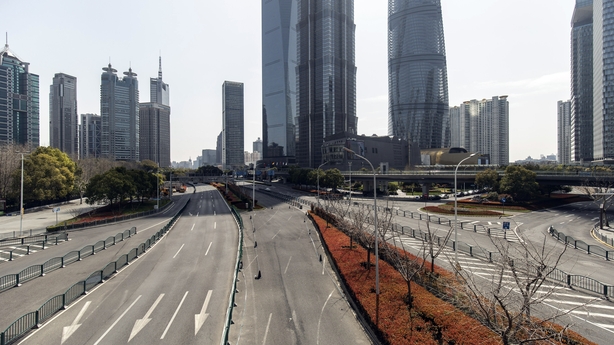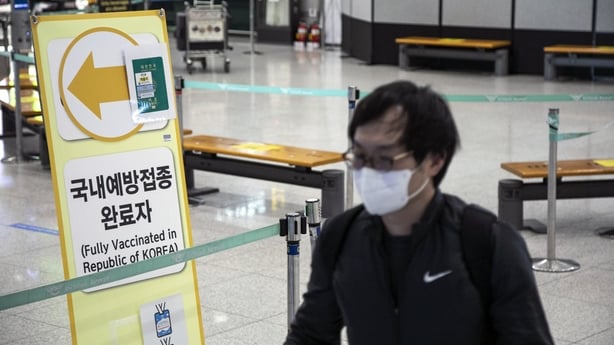New Zealand will relax its strict Covid-19 rules this week because case numbers have peaked and the population has high levels of immunity, Prime Minister Jacinda Ardern has said.
Ms Ardern said limits on outdoor crowd numbers would be scrapped late on Friday, allowing sporting events and concerts to take place with unrestricted crowds.
She said vaccine passes and scanning codes would no longer be compulsory from 4 April and most vaccine mandates, requiring employees to be immunised or face the sack, would be dropped.
"This is not the end, but in some ways it is also a new beginning," Ms Ardern told reporters, saying the changes acknowledged that "Covid is here to stay".
"To date, we've had more than 500,000 reported cases of Covid-19 and expert modellers say there have probably been 1.7 million actual infections," she said.
"That figure, coupled with 95% of New Zealanders being fully vaccinated, means we now have a high level of collective immunity."
The announcement comes a week after Ms Ardern outlined plans to open New Zealand's borders earlier than originally scheduled.
New Zealand was widely praised for keeping Covid-19 out of the community for extended periods during the pandemic, but it is currently experiencing a wave of Omicron-variant infections, with almost 21,000 new cases recorded yesterday.
However, the population is highly vaccinated and there have been just 177 coronavirus-related deaths in a population of five million.
"While we've been successful, it's also been bloody hard," Ms Ardern said.
"I want to start by thanking New Zealanders for the enormous sacrifices they've made over the past two years."
Ms Ardern said vaccine mandates for the police, military and education sector would be dropped, although they would remain for healthcare and border workers.
She denied the move was linked to protests in Wellington, which ended in rioting early this month as police removed a camp of anti-vaccine demonstrators that occupied the grounds outside parliament for three weeks.
"(We're acting) because it's safe to do so, not because anyone arrived on the front lawn of parliament," she said.
Shanghai warns against 'panic' as Covid cases mount
Shanghai authorities have called for calm as worried citizens swamped online grocery platforms to stock up on food over fears of impending lockdowns in a city struggling to halt a Covid spike.
China is experiencing its worst Covid-19 outbreak since the start of the pandemic more than two years ago, with Shanghai posting record-high case counts as the highly transmissible Omicron variant frustrates authorities.
China's biggest city reported 981 cases today, all but four of them asymptomatic, a number that dwarfs any previous daily tally in the city and which is nearly one-fifth of the day's national total.
Shanghai has responded to the outbreak with targeted residential lockdowns in areas with confirmed cases or close contacts.
There are growing public fears of more local lockdowns or stay-at-home orders for the entire city of roughly 25 million people.

Public concern has spiralled in the city in recent days and residents have taken to social media to air their frustrations.
They have complained about unclear government messaging, alarmist posts about expanding test sites and impending lockdowns, and the announcement that at least two indoor arenas in the city had been converted into mass-quarantine sites.
"We hope that everyone will not believe or spread rumours, and especially do not maliciously spread rumours that cause panic in society," Wu Jinglei, head of Shanghai's health commission said at a daily briefing.
Shops have seen bustling business as consumers stock up, and social media images circulated late yesterday showing crowds of shoppers converging on outdoor vegetable markets. The images could not be independently verified.
Online shoppers today posted complaints that platforms were crashing under the strain or that some goods were unavailable.
South Korea's total Covid cases top 10 million
South Korea's total coronavirus infections topped 10 million, or nearly 20% of its population, authorities said, as surging severe cases and deaths increasingly put a strain on crematories and funeral homes nationwide.
The country has been battling a record Covid-19 wave driven by the highly infectious Omicron variant even as it largely scrapped its once aggressive tracing and quarantine efforts and eased social distancing curbs.
The Korea Disease Control and Prevention Agency (KDCA) reported 490,881 cases for yesterday, the second highest daily tally after it peaked at 621,205 on 16 March.
The total caseload rose to 10,427,247, with 13,432 deaths, up 291 a day before.

The country's infection and death rates are still far below those recorded elsewhere, as almost 87% of its 52 million residents are fully vaccinated and 63% have received booster shots.
But the death toll nearly doubled in just about six weeks, with daily fatalities peaking at 429 last Friday, fuelling demand for funeral arrangements.
The health ministry on Monday instructed the 60 crematories nationwide to operate for longer hours, and the 1,136 funeral parlours to expand their facilities.
The number of critically ill patients has been hovering above 1,000 over the past two weeks, but it could go up to 2,000 in early April, a health ministry official said. Around 64.4% of the intensive care unit beds are occupied as of today, compared with some 59% two weeks earlier.
As part of efforts to curb severe cases and deaths, South Korea's drug safety agency granted emergency approval for the use of Merck's Covid-19 treatment pill for adults.

